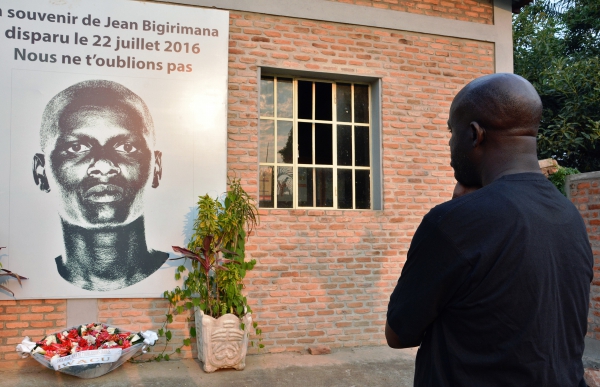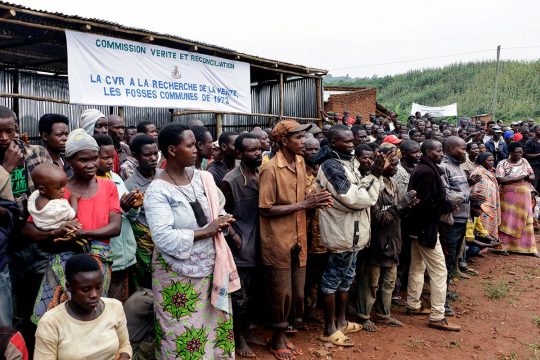January 27 was International Holocaust Remembrance Day. Seventy years on and thousands of miles from where it happened, this day for prevention of crimes against humanity also has resonance in Burundi. Louis-Marie Nindorera is a Burundian transitional justice expert. To mark this year’s international day, he penned these memories for Yaga, a collective of Burundian bloggers.
It was 20 years ago, in 1994. I was driving in the north of Bujumbura in my Peugeot 205, taking a two-year-old girl to see the heights and plains of the Burundian capital, as had become my habit. A few weeks earlier my cousin had rescued this little girl from one of the many Red Cross trucks bringing hundreds of refugees, survivors of the unspeakable genocide taking place in neighbouring Rwanda. As I took the roundabout where the road divides for Kamenge and Ngagera, I stopped to pick up an unarmed soldier wearing fatigues, who was standing waiting for a lift. As he approached my car and moved to open its rear door the little girl, previously good as gold, went into a hysterical fit. She convulsed on the back seat, holding her head in her small hands, shaking as if possessed, fixing the soldier with her gaze. Transfixed and not understanding, I tried in vain to calm her down. But the soldier had immediately understood. Calmly, he took two paces back and whispered to me: “It’s me, my uniform. Make your way in peace, I will manage”. Indeed, as soon as he went away, the little girl became calm again.
Catharsis
I might have forgotten this long-ago incident if it had not been for the man’s behaviour. He diagnosed the origin of a child’s behavioural problem, as if it happened every day. He retreated like a man already convicted, again as if it happened every day. My porous memory has retained this and it has worked on my mind. In the Hell that was then southern Rwanda, from whence this little angel had been extracted, the Devil appeared in a uniform, in military fatigues, engraved in memory as the “professional men” who destroyed her family. 150 kilometres further south in Bujumbura, it was another “professional” who solved this enigma for me, in a fraction of a second.
On this January 27, as happens each year, the world marks the International Day of Holocaust remembrance and prevention of crimes against humanity. This year the day has brought back to my mind the brutal resurgence of this little girl’s trauma. In my mind, the shock is linked to the seasoned response of that foot soldier who disappeared as quickly as he appeared. His “arms-bearing profession”, I am convinced, had no doubt led him to be a recidivist player in indecipherable human tragedies. By meeting them as an unpunished player at the bottom of a hierarchy that is itself unpunished and sometimes rewarded, he had ended up cutting his losses, no doubt burying his conscience with the lame but comforting excuse that he was just “following orders”.
Collective learning
This International Holocaust Remembrance Day also makes me think of an essay by French philosopher Alain Finkelkraut, “Vain memory and crimes against humanity”, inspired by the trial of Nazi war criminal Klaus Barbie, who was convicted in Lyon in 1987. Finkelkraut argues brilliantly that no human being should ever be excused of crimes against humanity arguing that they were just a humble executor following orders in the chain of death.
It is to this type of thinking, collective learning and awareness of everyone’s responsibility, that Burundi’s Truth and Reconciliation Commission should lead the people. Its mission is much more complex than identifying the Klaus Barbies for public vengeance, because in Burundi decades of violence and impunity have veiled and confused the roles of victims, perpetrators and saviours, often with the explicit will or at least consent of the authorities. In such conditions, unravelling the chain of responsibilities is a thorny task and a big challenge for the Commission. In January 2018, this Commission enters the last twelve months of its mandate, which may be extended for a further year. The hour of truth is upon us.
This article first appeared on Yaga, a collective of Burundian bloggers.






